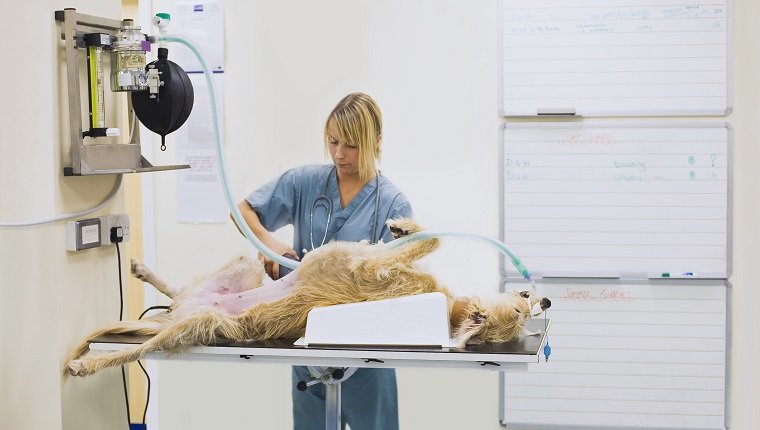Peritonitis in dogs is a condition where the peritoneum, which is the thin, watery membrane that lines the abdominal cavity, becomes inflamed. This happens when the abdominal cavity suffers injury, which can be caused by physical trauma, disease, a stomach ulcer, or other problems.
The most common cause is bacterial infection that moves to the abdomen from an external wound or from perforation of an internal organ. An affected dog may seem to be well, then suddenly become ill. The condition is usually painful, and most dogs will show signs of discomfort when touched on the abdomen.
If you see the signs of peritonitis in your dog, then you must get to your veterinarian for a proper diagnosis and treatment, as it can be a life-threatening condition. Here’s what you should know about the symptoms, causes, and treatments for peritonitis in dogs.
Symptoms Of Peritonitis In Dogs

In most cases, the symptoms of peritonitis in dogs are easy to recognize. Your dog may seem fine, then suddenly become very ill. They will almost certainly show signs of pain when you touch their abdomen.
If you see one or more of the following symptoms in your dog, consult your vet right away:
- Fever
- Vomiting
- Diarrhea
- Black stools
- Anorexia
- Lethargy
- Weakness
- Abdominal pain
- Taking unusual positions to relieve pain
- Low blood pressure
- Increased heart rate
- Increased respiration rate
- Low body temperature
- Pale gums
- Jaundice
- Swelling in the abdomen
- Ascites
- Arrhythmia
Causes Of Peritonitis In Dogs

There are several possible causes of peritonitis in dogs. The most common is bacterial infection that moves to the abdomen from an external wound or perforated organ, but there are many other factors that may lead to this condition.
Here are some of the possible causes of peritonitis in dogs:
- Intestinal or stomach tumor that ruptures the bowel
- Stomach or intestinal ulcer, which can be caused by anti-inflammatory medications
- Liver abscess
- Pancreatic inflammation
- Ruptured gallbladder or bile duct
- Ruptured bladder
- Perforated colon
- Ruptured uterus
- Ruptured appendix
- Diverticulitis
- Liver, heart, or kidney disease
- Chemical contamination
- Prostate cysts
- Wound or injury to the abdomen
Treatments For Peritonitis In Dogs

Treatment for peritonitis in dogs may begin with hospitalization if the condition is serious. The vet may give the dog intravenous fluids, and if the dog needs nutritional support, the vet may then place a feeding tube into the digestive tract or administer feedings via injection.
Depending on the severity and cause of the condition, the vet may need to perform surgery. This is especially true in cases where a bacterial infection or chemical contamination is the cause of the peritonitis.
Surgery for these conditions involves flushing the abdomen with saline. However, many dogs don’t recover from this kind of peritonitis, as it is quite life-threatening.
Affected dogs will likely need diet changes to help with fluid retention. Vets often prescribe a low-sodium diet, especially for dogs who have heart disease. Vets may also prescribe medications, including antibiotics or drugs to control pain.
Additionally, dogs will need follow-up vet visits to make sure there are no recurring symptoms.
Have you ever had a dog who suffered from peritonitis? How did your vet treat it? Let us know in the comments below!




